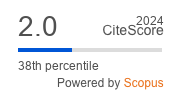The Role of FLT3-ITD Mutation, PI3K/AKT Pathway, and Leukemia Stem Cells in D3A7 Induction therapy – the Outcomes of Adult Indonesian Patients with Acute Myeloid Leukemia
DOI:
https://doi.org/10.5644/ama2006-124.453Keywords:
FMS-like Tyrosine Kinase, Daunorubicin, CytarabineAbstract
Objective. This cohort study aimed to examine the impact of the FLT3-ITD mutation on the downstream signaling pathway of PI3K/AKT pathway, the percentage of leukemia stem cells, and the survival of patients receiving D3A7 induction therapy.
Method. Bone marrow mononuclear cells were collected from 20 adult AML patients who had completed D3A7 induction therapy at Cipto Mangunkusumo National General Hospital and Dharmais Cancer Hospital. FLT3-ITD gene mutation was examined by the PCR-sequencing method. Expression of phosphorylated PI3K and AKT was detected using the sandwich ELISA method. Flow cytometry was used for detecting the number of apoptosis and proliferation cells, and biomarkers of leukemia stem cells.
Result. The expression levels of PI3K and AKT proteins were higher in FLT3-ITD, both in the mutant group compared to the non-mutation group, and in the patient group with treatment failure outcomes compared to the patient group with treatment response. The percentage of the leukemia stem cell population did not differ significantly between the FLT3-ITD mutation group and the wild type group, and between the treatment failure outcome group and the response outcome group.
Conclusion. This study presents the important role of FLT3-ITD mutation via its downstream signaling (PI3K/AKT) in the outcome of D3A7 induction therapy. The FLT3-ITD mutation plays an important role in the 12-month survival of AML patients after D3A7 therapy. However, the outcome of D3A7 therapy and FLT3-ITD mutation were not associated with leukemia stem cells.
Downloads
Published
Issue
Section
License
Copyright (c) 2024 Elly Yanah Arwanih, Ikhwan Rinaldi, Septelia Inawati Wanandi, Melva Louisa

This work is licensed under a Creative Commons Attribution-NonCommercial 4.0 International License.





